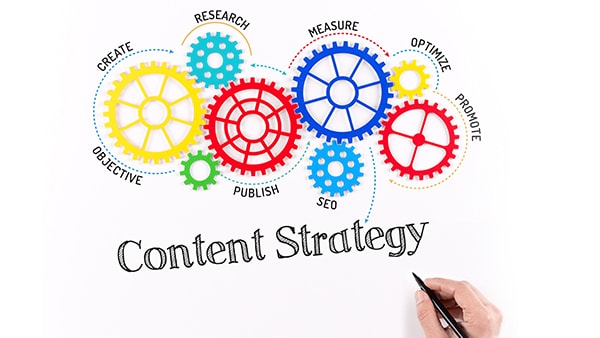When it comes to content marketing, most businesses big and small are already either fully on board or at least dipping their toes into it – 81% of Australian organizations according to the latest research by the CMI. And why wouldn’t they be? From improved visibility in search engines to generating new leads, building loyalty and establishing thought leadership, it promises countless benefits.
But to win at content marketing, it’s not as simple as just spawning ideas, creating blogs, articles and other media and distributing it regularly. Success in content marketing, as in any area of business, depends on having a clear strategy in place.
So, before you let implementation run away with you, here are 5 reasons why content strategy is a must.

1. It gives your efforts a clear purpose
It’s no good creating and publishing great content if you don’t have a clear idea about why you are doing it. Yes, you might be reaching your audience and attracting likes and shares but to what end? What are you trying to achieve? This is where content strategy comes in.
Ultimately, are you looking to increase sales, generate leads, build a stronger brand or demonstrate your authority? Whatever it is, by defining clear content marketing objectives, ones that align with your overall business goals, it is easier to drive focused action and produce content that delivers.
2. It saves you time and money
Any business can implement a content marketing plan, but to be effective your plan needs a plan. Rather than just pumping out content for content’s sake, and expending huge amounts of time and money in the process, having a content strategy makes you step back and think before you act.
By helping you more clearly define your goals, your target audience, what formats and types of content engage them and how often and when you should be targeting them, a content marketing strategy can help you better concentrate your efforts and resources where they’ll be most likely to make an impact.
3. It helps you build trust
Consistency is essential in building trust, and this certainly holds true when it comes to content. But maintaining consistency is not easy without a content strategy in place. Because a content strategy looks at the bigger picture it enables you to ensure that all of your content is working together as a whole.
If each piece of content you create follows a central theme, is of the same editorial quality and follows the same voice and tone, not only does it tell a compelling story about your brand, but it also means people know what to expect. Far from breeding contempt, this familiarity will keep people coming back to your business time and time again.
4. It makes implementation easier
Part of content strategy is deciding what people and processes are needed to support content creation and management, including who will be responsible for ensuring it stays on-strategy. This attention to detail when it comes to implementation is vital if your content marketing plan is to run smoothly.
If you are clear on who will be generating ideas for content, who will be producing it, who will be editing it, who will be uploading it and who will be overseeing the process, as well as what resources and procedures are required at each stage, your content marketing efforts have a much better chance of success.
5. It keeps you on track
Because a content strategy makes you clearly define your content objectives and sets out what content you will create, who you will create it for and how and when you will deliver it, it is crucial in helping keep your content efforts on track.
Whilst your digital analytics tools will show you how each piece of content is performing, e.g. number of likes and shares, clicks to website, conversion rate – your content strategy is your point of reference by which you can determine whether you goals are being met. If they’re not, it’s time to revise your strategy.
Although it is possible to plough ahead with content marketing without a strategy in place, having one will not only make implementation easier but will help you achieve your business goals. But importantly, to be effective it must be done right.
A successful content strategy should be: documented; targeted; unique to your business; measured; and cover all distribution channels from your website to social media and beyond. By spending time on your strategy you can more successfully engage, entertain and inform your audience, which, in this information age, is the key to winning.

